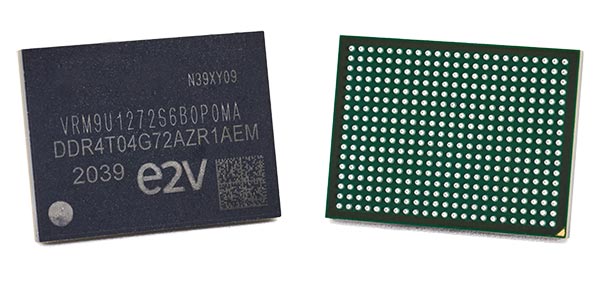 The progression of Teledyne e2v Semiconductors’ ultra-high density DDR4 memories continues, with news that flight models are now being shipped to key customers around the world. It signifies a major step forward in the ground-breaking project – after sampling successfully led to widespread design-in activity and adoption of this technology. Consequently, the company is now moving into the mass production phase, with the space-grade radiation-tolerant DDR4s being available.
The progression of Teledyne e2v Semiconductors’ ultra-high density DDR4 memories continues, with news that flight models are now being shipped to key customers around the world. It signifies a major step forward in the ground-breaking project – after sampling successfully led to widespread design-in activity and adoption of this technology. Consequently, the company is now moving into the mass production phase, with the space-grade radiation-tolerant DDR4s being available.
With a 4GByte storage capacity, and dimensions of just 15mm x 20mm x 1.92mm, Teledyne e2v’s DDR4s exhibit a much higher storage density than competing solutions – taking up only half the PCB real estate, and almost an order of magnitude less volume. Maintaining elevated performance on an ongoing basis, they deliver data transfer speeds of 2.4GT/s.
Supplied in a multi-chip package (MCP) format, each Teledyne e2v DDR4T04G72 memory features expansive bus capabilities, where 64bits are assigned to data transfer and an additional 8bits for error correction. The DDR4T04G72 is an optimal companion for the company’s own Qormino® processors and they are also compatible with the vast majority of processors, SoCs and FPGAs from other vendors.
Thanks to their high reliability construction and high degree of radiation tolerance, these devices will be a pivotal resource for space-deployed edge computing platforms. Radiation testing and characterization conducted on these DDR4s show that their single event latch-up (SEL) threshold is greater than 60MeV.cm²/mg. Their single event upset (SEU) and single event function interrupt (SEFI) data also exceeds 60MeV.cm²/mg, and they have demonstrated resilience to 100krad total ionizing dose (TID).
Teledyne e2v’s DDR4s can be ordered in both industrial temperature range (-40°C to 105°C) and military temperature range (-55°C to 125°C), and up to NASA Level 1 (based on NASA EEE-INST-002 – Section M4 – PEMs). This will mean that a greater breadth of potential applications can be addressed.
“We are recognized as leading the way in elevated density radiation tolerant memory for space applications, and our technology has already been incredibly well received by the market. What differentiates us from the competition is the comprehensive and open data package we provide, giving clients everything they require to start their designs and complete them in the shortest possible timeframe, with all the background information and expert engineering support readily available,” states Thomas Guillemain, Marketing & Business Development Manager at Teledyne e2v. “The space industry is presented with an assured supply of compact, easy to interface memories that raise the performance benchmark. We are making great headway on the next stage of our roadmap, with other generations of even higher capacity devices currently in the pipeline.”


